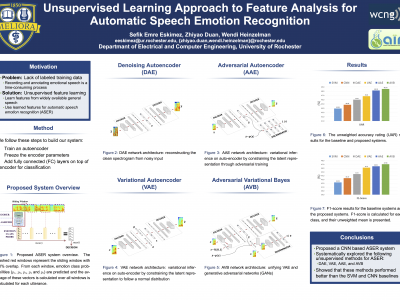Documents
Poster
UNSUPERVISED LEARNING APPROACH TO FEATURE ANALYSIS FOR AUTOMATIC SPEECH EMOTION RECOGNITION

- Citation Author(s):
- Submitted by:
- Sefik Emre Eskimez
- Last updated:
- 19 April 2018 - 4:01pm
- Document Type:
- Poster
- Document Year:
- 2018
- Event:
- Presenters:
- Sefik Emre Eskimez
- Paper Code:
- SP-P1.5
- Categories:
- Keywords:
- Log in to post comments
The scarcity of emotional speech data is a bottleneck of developing automatic speech emotion recognition (ASER) systems. One way to alleviate this issue is to use unsupervised feature learning techniques to learn features from the widely available general speech and use these features to train emotion classifiers. These unsupervised methods, such as denoising autoencoder (DAE), variational autoencoder (VAE), adversarial autoencoder (AAE) and adversarial variational Bayes (AVB), can capture the intrinsic structure of the data distribution in the learned feature representation. In this work, we systematically investigate four kinds of unsupervised feature learning methods for improving speaker-independent ASER. We show that all methods improve the performance regarding unweighted accuracy rating (UAR) and F1-score over methods that use hand-crafted features or that do not perform feature learning on external datasets. We also show that VAE, AAE and AVB methods, which control the distribution of the latent representation, outperform DAE that does not control such distribution. This suggests the benefits of using variational inference methods to learn features from general speech for the speech tasks such as ASER that has very limited labeled data.

